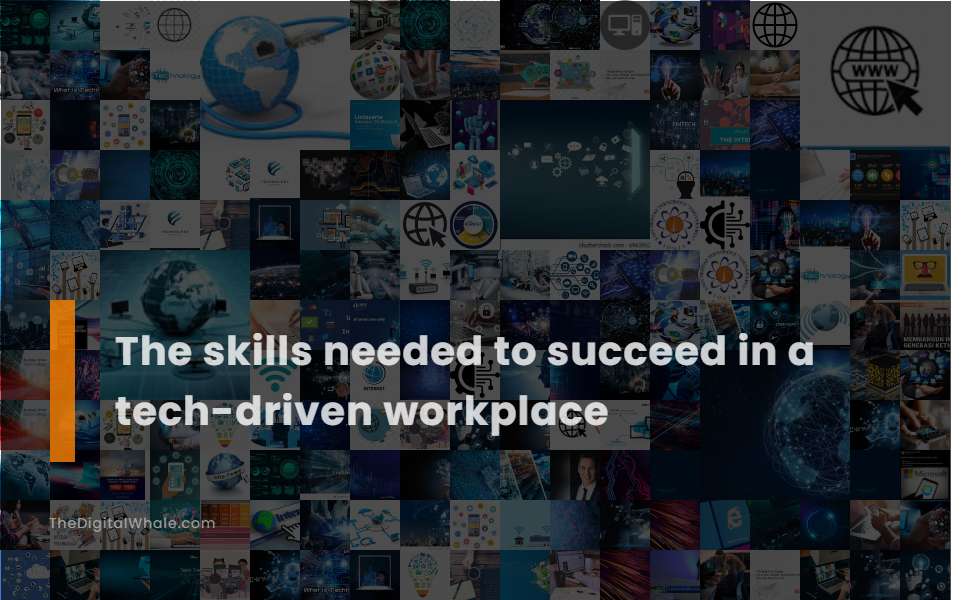The Skills Needed To Succeed In A Tech-Driven Workplace
What are five skills that are necessary for success in the modern workplace? What are some tips for developing interpersonal skills in the tech industry? Let's find out more about The Skills Needed To Succeed In A Tech-Driven Workplace.

Digital Literacy: Understanding how to use computers, smartphones, and other digital devices.
Digital Literacy in a tech-driven workplace involves five key skills: technical skills to use digital devices and software, independent research to gather and evaluate online information, media literacy to critically analyze and create media content, digital citizenship to maintain responsible online behavior, and communication and collaboration skills to engage effectively using digital tools.
Internet Proficiency: Efficiently navigating the internet, using search engines, and recognizing secure websites.
To succeed in a tech-driven workplace, internet proficiency involves mastering internet navigation skills, using search engines efficiently, and practicing secure online behavior, such as recognizing secure websites and utilizing search engines effectively. For more insights on developing these skills, visit the Tech Savviness blog, which provides valuable information on enhancing your internet capabilities.
Word Processing and Spreadsheets: Using tools like Microsoft Word, Excel, Google Docs, and Sheets.
To succeed in a tech-driven workplace, you need proficiency in word processing tools like Microsoft Word and Google Docs, and spreadsheet skills using Microsoft Excel and Google Sheets, including creating and formatting documents, managing spreadsheets with functions and formulas, and organizing data effectively.
Email Communication: Composing, sending, and managing emails using various platforms.
To succeed in email communication in a tech-driven workplace, it is crucial to master skills such as crafting attention-grabbing subject lines, structuring messages for maximum impact, and ensuring clear and concise communication to avoid misunderstandings and expedite workflows. Effective Email Communication Skills include strong communication, attention to detail, and maintaining professionalism in all emails, regardless of the recipient, to ensure efficient and respectful correspondence.
Cloud Computing: Storing and accessing data over the internet using platforms like Google Drive, Dropbox, or Microsoft OneDrive.
To succeed in Cloud Computing, key skills include programming languages like Java, JavaScript, and Python, platform expertise in Amazon, Microsoft, and Google Cloud services, and abilities in database management, system design, and cloud deployment and migration across multiple platforms. Additionally, understanding cloud storage models, security, and scalability is crucial for managing and accessing data efficiently over the internet. For those looking to delve deeper into these essential skills, Northeastern University Resources offers valuable insights and guidance.
Related:
What is the main reason businesses use technology today? What are the major benefits of using technology in communication? Let's find out more about The Role of Technology In Communication and Collaboration.
Social Media Savvy: Creating content, engaging with others, and building an online presence on platforms like LinkedIn, Twitter, and Facebook.
To succeed in a tech-driven workplace with social media savvy, you need skills such as analytical skills to interpret social media metrics, creativity to devise engaging content, communication to interact effectively with your audience, and project management to coordinate and implement marketing campaigns across platforms like LinkedIn, Twitter, and Facebook. Additionally, understanding trends, time management, and flexibility are crucial for adapting to the ever-changing social media landscape and tailoring content to each platform's unique audience preferences. For more insights on enhancing these skills, explore this comprehensive guide on Social Media Skills.
Adaptability to New Tech Tools: Willingness and ability to learn new tools and platforms.
In today's tech-driven workplace, succeeding requires a high level of adaptability to new technological tools. This involves a willingness and the ability to quickly learn and adopt new technologies, platforms, and processes. Embracing a culture of innovation and flexibility is essential to stay agile and competitive in the ever-changing landscape. According to Mondo, employees must cultivate skills such as digital literacy, resilience, and a growth mindset to thrive in evolving environments, which highlights the importance of being able to swiftly adjust to new processes and work environments.
Analytical Abilities: Identifying and solving problems, conducting data analysis, and identifying trends.
To succeed in a tech-driven workplace, analytical abilities are crucial, involving critical thinking, data analysis to identify patterns and trends, problem-solving to overcome obstacles, and attention to detail to ensure accuracy and quality in decision-making and process optimization.
Problem Solving: Solving technical issues through logical thinking and persistence.
To succeed in a tech-driven workplace, problem-solving skills involve critical thinking, analytical skills, creative thinking, technical skills, and effective communication. These skills enable tech professionals to identify patterns, break down complex problems, think outside the box, stay updated with the latest technologies, and collaborate effectively with team members and stakeholders. For more insights on enhancing these abilities, visit the Tech Problem-Solving Skills guide. By honing these skills, professionals can navigate the rapidly evolving landscape of the tech industry with greater ease and adaptability.
Critical Thinking and Project Management: Managing multiple projects, meeting deadlines, and making strategic decisions.
To succeed in a tech-driven workplace, project managers need to employ critical thinking skills to define problems accurately, evaluate risks and alternatives, enhance communication and alignment, and integrate systems thinking. This involves creating space for reflection, encouraging open dialogue, leveraging real-time feedback, and addressing root causes rather than symptoms to make innovative and practical decisions. For a deeper understanding of these concepts, visit the Critical Thinking in Project Management article, which provides valuable insights into effectively managing projects in today's dynamic environment.
Related:
What has been the impact of technology on the way we work and live? What is the impact of technology on work environment? Let's find out more about The Impact of Technology On the Way We Work and Live.
